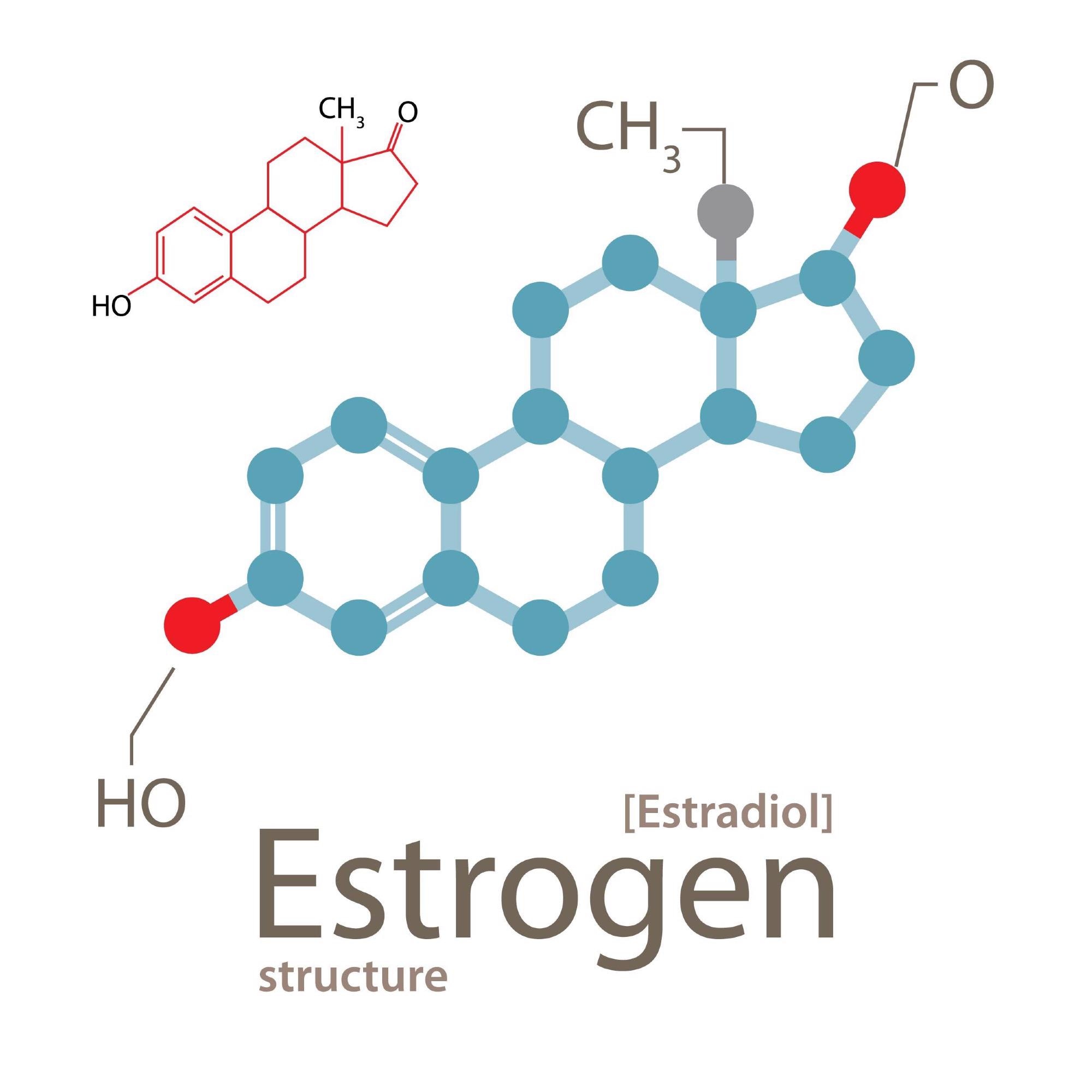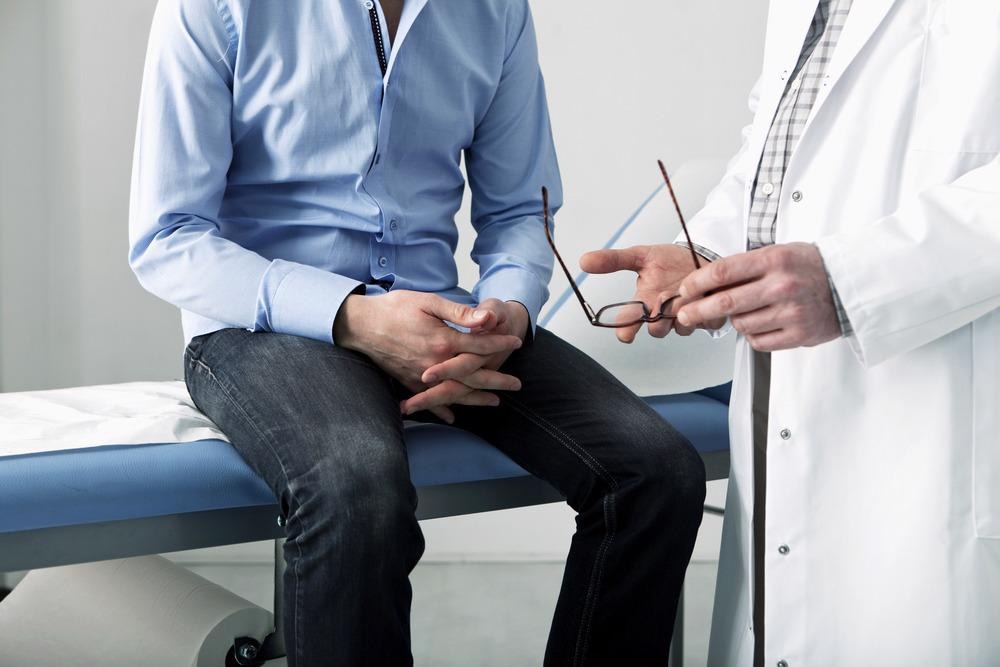Two main sex hormones serve the normal functioning of each gender, for women, it is called estrogen, and for men, it is testosterone. Both hormones are designed to play an important role in each gender but estradiol (the main form of estrogen), surprisingly, has an important function in men’s day-to-day health.

Estrogen. Image Credit: yaruna/Shutterstock.com
The presence of estrogen in a man's body is extremely important, since they perform several important functions at once, including:
- ensuring that muscle mass gain is processed in the correct way
- preservation of bone strength
- maintaining a stable nervous system and emotional state
- maintaining the correct metabolism
- prevention of the development of muscle and organ hypoxia even with strong physical exertion
- prevention of the development of diseases of the cardiovascular system
- maintaining the normal appearance of the skin
What function does estrogen serve?
In men, estrogen in the form of estrone and estradiol is produced by the conversion of testosterone into the enzyme aromatase. Estradiol has a stronger affinity for estrogen receptors and is an isoform used in clinical practice.
The effects of estrogens on cognition and mood have been well documented. Indeed, estrogen receptors are densely concentrated in the structures of the brain that control cognitive and emotional functions. These include subcortical regions such as the hippocampus (memory) and amygdala (emotion), as well as several cortical regions involved in higher-order functioning.
Estrogens modulate neurotransmitters responsible for cognitive and emotional processes. For example, estrogens decrease sensitivity to dopamine receptors and increase the density of D2 receptors in the striatum of ovariectomized rats, and significantly increase serotonergic neurotransmission.
Estrogens appear to have a protective effect on neurodegenerative disorders characterized by major cognitive dysfunctions, including Parkinson's disease and Alzheimer's disease.
What estrogen level should a man have?
The normal estrogen level that a man should have depends on his age and medical history. A fully grown male usually has an estradiol level of 10-40 picograms per milliliter (pg/ml) and an estrone level of 10-50 pg/ml.
Although the male body needs estrogen to function properly, high estrogen levels can cause health problems such as gynecomastia, erectile dysfunction, or infertility.
Where is estrogen produced in men, and what are its functions?
The key compound that makes estrogen in men is the aromatase enzyme. This enzyme converts testosterone to estradiol (the predominant form of estrogen), converting one of the four cycloalkane rings to an aromatic ring.
Aromatase has been found in male brain tissue, testes, adipose tissue, blood vessels, and skin. In addition, many cells of the male body have estrogen receptors, which means that the female hormone performs certain functions and does not appear as a simple by-product or intermediate product of biochemical reactions.
The role of estrogen in the male body is being explored in detail by Eric Weebow (Center for Prostate Research, Vancouver, Canada) and Richard Wosersag (Department of Urology, University of British Columbia, Vancouver, and the Australian Center for Gender, Health and Society, Trobe University, Melbourne), whose popular article on this topic was recently published by American Scientist magazine.
The general area of scientific interests of Weebough and Wosersug - the treatment of prostate cancer - is closely related to the study of sex hormones and is of much greater applied importance than the search for the elixir of youth.
Estradiol plays an important role in early life for both sexes. The SRY gene, located on the Y chromosome of males, is responsible for determining the sex of the embryo: this gene encodes a special protein that directs the development of the male embryo. In its presence, testes develop from the embryonic gonads; if it is absent, ovaries develop.
In the male embryo, already during intrauterine development, the testes produce hormones, primarily testosterone, which control the development of male sexual characteristics - the penis, scrotum, and prostate gland.
Female embryos do not have a Y chromosome. But the gene can be "silent" in the male embryo, for example, due to a mutation or the complete absence of the desired site in the Y-chromosome. If this gene is absent or hormonal signaling is impaired for another reason (for example, in the androgen insensitivity syndrome, which was previously called Morris syndrome), then female genitals are formed, even when the individual has XY sex chromosomes.

Men's health. Image credit: Image Point Fr/Shutterstock.com
The importance of estrogen and estradiol
During pregnancy, all embryos, regardless of their chromosomal sex, are exposed to estradiol from the mother's placenta. (This effect has been studied in detail in rats, one of the favorite models of embryologists.) The developing brain of the embryo neutralizes its influence with the help of alpha-fetoprotein, which binds to estradiol in the blood and prevents it from penetrating the blood-brain barrier.
In contrast, testosterone produced in the male embryo is not bound to AFP and can freely enter the brain. In the brain, testosterone aromatizes into estradiol, and, paradoxically, forms the male-patterned regions of the embryo's brain. For example, the preoptic region in the hypothalamus, which controls male sexual behavior, is larger in males than in females.
Men with low estrogen levels have higher levels of internal (visceral) abdominal fat, which is known to increase the risk of cardiovascular disease, diabetes, and metabolic syndrome. In addition, men with estrogen deficiency have reduced bone strength and an increased risk of bone fractures.
References:
- Roth SM, Ivey FM, Martel GF, Lemmer JT, Hurlbut DE, Siegel EL, et al. (November 2001). "Muscle size responses to strength training in young and older men and women".
- Gillies GE, McArthur S. Estrogen actions in the brain and the basis for differential action in men and women: a case for sex-specific medicines. Pharmacol rev.
- Wibowo E, Schellhammer P, Wassersug RJ. Role of estrogen in normal male function: clinical implications for patients with prostate cancer on androgen deprivation therapy.
- Handa RJ, Ogawa S, Wang JM, Herbison AE (January 2012). "Roles for oestrogen receptor in adult brain function". Journal of Neuroendocrinology.
- Carani C, Qin K, Simoni M, Faustini-Fustini M, Serpente S, et al. Effect of testosterone and estradiol in a man with aromatase deficiency.
Further Reading